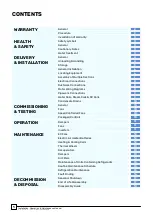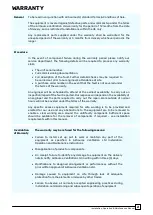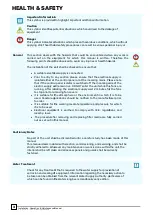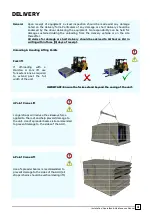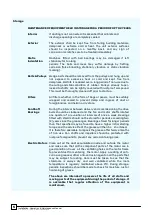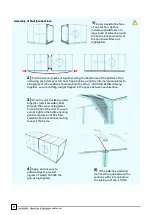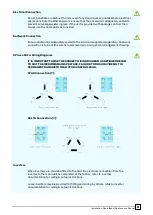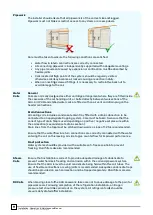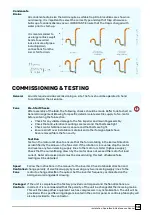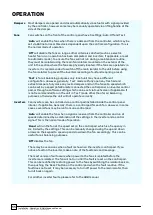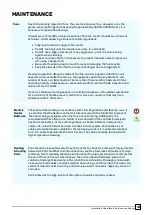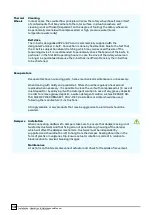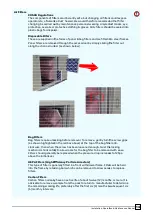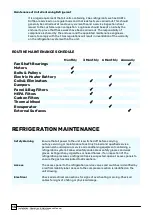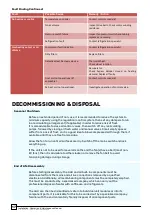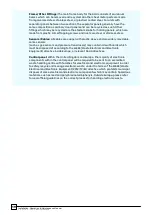
5
Installation, Operation & Maintenance Manual
fgfgffhfgfggbffgfV11:0212212121
All units must be installed in accordance with good engineering standards, upright and
level on a prepared base. Fixing down of air handling units is at the discretion of the
installer and dependant of the site conditions.
Flexible connections are NOT recommended for connecting ductwork to the unit, as the
fan outlet is fitted with a flexible connector and is isolated from the unit via anti-vibration
mounts.
Provision must be made for a cleanable drain trap which should terminate at an open
drain or tundish which will ensure any blockage can be seen and remedied.
Units that are delivered in sections should be carefully checked with the general
arrangement drawings to ensure erection in the correct sequence and handing. The
sections would be bolted together using the fixing strips, screws and sealing strip
provided.
Electrical
Installation
Site wiring must not penetrate or restrict opening or removal of access panels
Before mounting unit in position it is advisable that consideration is given to the access
requirements of the unit, particularly with reference to the following : That provision is
made in the plant room or wherever the unit is to be installed for access to remove the
following components :
Fans
Electric Heater Batteries
Filters (bags or panels)
Coils and Pipe work
Access space is also essential for service and maintenance purposes
and for the removal of the motor(s).
Storage
MAINTENANCE OF EQUIPMENT HELD IN STORAGE FOR A PERIOD OF UP TO 2 YEARS
Interior
If ducting is not connected it is essential that all inlets and
discharge openings are completely sealed
Exterior
The exterior shall be kept free from falling building materials,
dampness or extreme cold or heat. The unit exterior surfaces
should be inspected on a monthly basis and any sign of
corrosion or scratches are to be treated immediately.
Static
Machines fitted with ball bearings may be damaged if left
Indentation
stationary for too long
periods. The balls and races may suffer damage by fretting
corrosion (false brinelling, stationary vibration or static vibration
marking).
Belts & Pulleys
Wedge belts should be removed from the pulleys and hung up and
not exposed to excessive heat or cold and kept free from
dampness. Belt life is reduced over a long period of non-use due to
the curing and static condition of rubber. Pulleys already taper-
locked to shafts can be lightly covered with rustproof compound.
This must be thoroughly cleaned off prior to start up.
Filters
All filters, whether in the form of bags or panels, must be suitably
wrapped and sealed to prevent damp and ingress of dust or
foreign bodies, and held in a dry store.
Fan Shaft
During the interval between delivery and commissioning the drive
Bearings
belts should be slackened and the fan and motor shafts rotated
one quarter of a revolution at intervals of once a week. Bearings
fitted with shields should not be stored for periods exceeding two
(2) years since the grease ages. Bearings stored for longer periods
than that specified may be found to have a higher initial starting
torque and the service life of the grease will then be shortened.
It is therefore advisable to repack the grease after twelve months
of non use. Fan shafts and impellers should be protected with
rustproof compound to prevent any corrosion taking place.
Electric Motors
Clean out all the dust accumulated inside and outside the motor
and make sure that all the component parts of the motor are in
good condition. Cover all the ventilating holes on the motor frame
to prevent dust from entering the motor. Apply a coating of anti-
corrosion grease or other anti-corrosion agent on all the parts that
may be subject to rusting. Care must be taken to see that the
storeroom is always dry and well ventilated while the room
temperature is regularly maintained above 0°C. During storage,
periodic inspections should be made to check for moisture, rust or
hardening of grease.
The above are intended to preserve the life of all static and
moving parts of the equipment during the period of storage. It
is advisable that regular attention of the equipment is
maintained.


